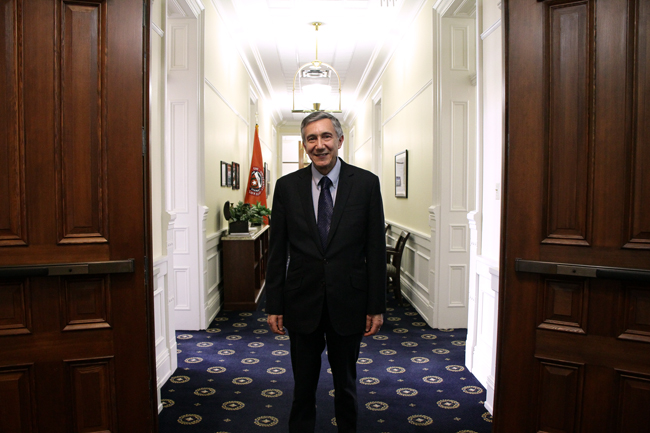Massive Open Online Courses, or MOOCs, are seemingly always making headlines across the nation. Conflicting reports of their success and failure follow each other in the same publications. Unclear and unqualified completion rate data color public opinion surrounding these innovative approaches to education. Overall, the paradigm remains the same that MOOCs are intended to be traditional courses designed for traditional students. This belief could not be farther from the truth.
Negative press aside, MOOCs retain the capability to transform the traditional model of education. Instead of relegating expert knowledge to the upper echelons of society, online opportunities democratize education. Through this developing model, content experts are distributing their expertise to the masses. MOOCs enable a freedom to learn by connecting underserved communities with the finest professors and institutions from around the world.
The University of Texas has been and always will be a university of the first class, but the diffusion of information and communications technologies in the 21st century has redefined the role of the University in research and education. The UT System established the Institute for Transformational Learning to prepare for the future by fostering innovation, producing best-in-class resources and pioneering new cost-cutting programs across the state. This Institute launched UT Austin’s MOOCs and supported this first round of research and development.
UT arrived about five years late to MOOC experimentation. The delay both benefits and curses these initiatives. On one hand, investment in experiments that seem to be in twilight informs public opinion and curtails interest. On the other hand, the University is able to leverage data from completed MOOCs all over the country to improve course development. Both the Center for Teaching and Learning at UT Austin and UT System’s Institute for Transformational Learning engage students, researchers, content experts and media professionals at the forefront of innovation in higher education.
Preliminary data, even from UT Austin’s record-breaking MOOCs, should quell any remaining fears regarding disruption in higher education. Students are not replacing traditional institutions of higher learning with MOOCs. Graduate students at this University are not choosing between registering for Michael Webber’s Energy Technology & Policy course or completing all the assignment to earn an edX certificate for Energy 101, a MOOC created from the same material.
However, motivated learners, and more importantly teachers, around the world can supplement traditional education with this expert-level content. Energy industry professionals, international policy researchers and general interest audiences tap into the content to expand their personal knowledge beyond their respective worlds. High school teachers effectively employ MOOC content and structure in their STEM classrooms to cultivate knowledge and interest beyond state-mandated curricula.
These are the virtues of free and open education. Learners can connect with content aligned with their interests to meet unique learning goals instead of chasing cookie-cutter learning objectives. Individual accomplishment, while difficult to quantify, should be identified as the new standard for MOOC success.
Accordingly, online learning initiatives like MOOCs will never disrupt brick-and-mortar educational institutions. Instead, they open the virtual doors of such institutions to the whole world. Since launching the first four MOOCs, UT Austin has expanded its footprint onto every continent. Geographically isolated individuals are joining virtual communities in online spaces based on their common interests and expertise. Quite simply, students from around the world without easy access to high quality education are connecting directly with UT’s professors.
Take, for example, Amanda, a 13-year-old Brazilian Energy 101 student who expressed her appreciation this way, “Energy is so important for me … I’ll take these lessons for the rest of my life.”
Profit margins and completion rates aside, it appears this UT Austin initiative is living up to the university’s tagline, and is in fact changing the world.
Tharpe is an anthropology and radio-television-film senior.





















